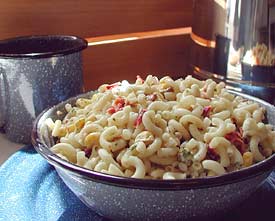 |


|
The backcountry menu then: pilot biscuits and Velveeta. The backcountry menu now: just-baked focaccia, wild blueberry scones, garlic fry bread or maybe some taste of crepes biologiques (aka organic griddle cakes). Then: pemmican and the original chili mac. Now: minestrone couscous, Mandarin Orange Chicken, vegetable risotto with turkey, chicken primavera or a new, organic chili mac. Then: trail mix, Space Food Sticks, Tang. Now: trail mix, chocolate brownie bars, energy gel. Then: Apple Brown Betty. Now: tiramisu, organic mango almond delicacy. Inviting, isn't it? This notion of sophisticated dining compressed into small, go-anywhere foil pouches. Here's the recipe: Hike many miles, make camp beneath a tree. Boil two cups of water in a pot, tear open a pouch half-filled with flakes and other freeze-dried ingredients. Stir it in and slap a lid on it. Pop it open five minutes later and, ta-da, you're eating Chicken Polynesian, Thai chicken or maybe even organic pasta. When packaged backpacking food appeared in the 1950s, its similarity to military rations and its uninspiring functionality left the public less than enamored with the concept. Despite perpetual improvements in taste, nutritional content and appearance, backpacking food has never quite shaken its food-of-last-resort status. So what is it that awaits backpackers on store shelves today - better food or just better marketing? "Freeze-dried food has changed," says REI product manager David Fieth, who oversees food buying for the retail chain. "It tastes better than it did years ago, and it's following food trends by offering healthier ingredients and more choices. I think people who haven't tried it for a while would be surprised by how good a lot of it has become." This specialized industry is dominated by the Big Four - Richmoor of Southern California, Mountain House of Albany, Ore., Alpine Aire of Rocklin, Calif., and Backpacker's Pantry of Boulder, Colo. Yet the newest entry in this category is also the one turning a lot of heads. Seattle-based Mountain Safety Research last year began distributing MSR Mountain Gourmet (formerly EcoCuisine), a line of organic, vegetarian food that it licenses from Idaho farmer Mary Jane Butters, a former backcountry ranger and carpenter turned organic-food empress. MSR carries 30 offerings from Butters' 50-item product line, including curried lentil bisque, organic pasta primavera and her hot-selling Outrageous Outback Oatmeal, packed with currants, sunflower seeds, soy milk, ginger and cinnamon. In the second year of distribution through MSR, Butters' food won Backpacker magazine's Editor's Choice Award for 2000, a sort of backcountry Oscar that recognizes outdoor products. "The best-tasting instant camp food we've sampled," the magazine raved. MSR moved quickly to enter the food business with Butters' organic/vegetarian flag. She reinforces her product's alternative-food stance by offering nutritious dishes, smaller portions and lightweight, brown paper packaging, which can easily be burned - perfect for campers who don't like to carry back waste. "It's something like you'd find in the organic sections of supermarkets," says MSR marketing/sales director Michael Glavin. "It's not a volume business; it's a top-of-the-pyramid niche product. If you're in a store buying a Coleman cooler, you're not buying this product," Glavin said, "but it's attractive to lighter eaters and the high-end backpacker who wants to eat (healthfully) in the backcountry." Butters, a mother of two who turns 47 next month, manages 38-acre Paradise Farm and a nearby, 109-year-old flour mill on the Washington-Idaho Palouse about eight miles outside of Moscow, Idaho. An Ogden, Utah, native, she spent two summers staffing fire lookouts before spending another two summers as a backcountry ranger in Utah's Uinta Mountains. Her husband of eight years, Nick Ogle, oversees his own 600-acre farm. The pair is something of a poster couple for organic farming; Butters, Ogle and one of their fields filled a full-page photograph in National Geographic when the magazine published a feature on alternative farming practices several years ago. Butters wants no part of toxicity in either her soul or her soil. At the moment, organic hay covers 20 acres of her farm. Government regulations mandate that land must be tended chemical-free for at least three years before its crops can be certified as organic. "In the past we've applied seaweed, kelp and microbes to try and jump-start the soil," Butters says. "Look at any land that has been farmed with chemicals and you can't find an earthworm in it. The land has no earthy smell; it doesn't breathe." Butters acknowledges she is an occasional meat eater; her husband sees to it that crop-munching deer routinely wind up on the dinner table, and she acknowledges that she recently sampled a neighbor's porcupine soup. Still, she is busy concocting new vegetarian recipes (her breakfast frittatas might make a comeback, and she's closing in on organic hash browns) while also spreading the organic gospel. "I can foresee a day when I'll be offering lines of office cuisine or campus cuisine," Butters says. "They'll be single-serve packages where you only add water. People like convenience, and they want to eat (more healthfully). People other than backpackers can appreciate this food."
Backpacker gives MSR menu a taste test
So what does MSR Mountain Gourmet food taste like? Here are the impressions of a hard-hiking, 200-pound, frequently ravenous male backpacker:
Organic Fiesta Pasta
Organic Chilimac
Southwestern Couscous
Organic Sweet Corn and Black Bean Chowder
Organic Curried Lentil Bisque
Organic Mango Almond Delicacy Delight MSR Mountain Gourmet (EcoCuisine) products are available at REI stores, Outdoor & More in Seattle and Wilderness Sports in Bellevue; [or from this website].
|
